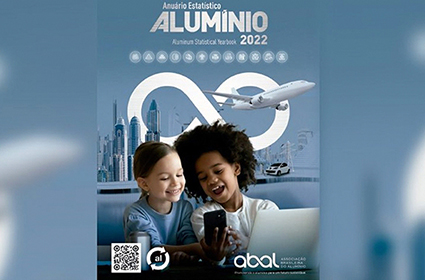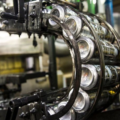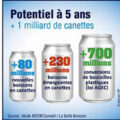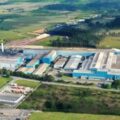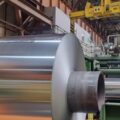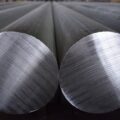ABAL data reveal that the aluminum sector appears to be stronger than before. The Brazilian Aluminum Association reported that last year’s production had a significant increase of 5.1%, and gross investments had an increase from R$1.2 billion in 2021 to R$1.9 billion in 2022, representing a 58% jump. The data are from the 52nd edition of ABAL’s Statistical Yearbook, now published in July with the main information on the sector in the year 2022 in Brazil and worldwide.
The report published on the Brazilian aluminum industry suggests that, despite a slight drop in consumption, a moderately positive outlook was evidenced by an increase in production, employment and investments.
In 2022, there was a significant increase in the industry’s revenues, which reached R$140.1 billion. This figure represented an increase of 13.7% for that sector compared to 2021 when it was 123.2 billion. At the same time, its share in Gross Domestic Product and industrial GDP remained practically unchanged at 1.4% and 6.8%, respectively.
The primary aluminum production sector showed a moderate increase in 2022, indicating the gradual recovery of capacity. At the end of the year, the accumulated volume was approximately 811 thousand tons.
Since 2015, aluminum manufacturing had been discontinued. However, the Maranhão Aluminum Consortium (Alumar) decided to restart it and put into operation the companies Albras located in Barcarena, Alumar in São Luís and CBA in Alumínio.
During 2022, a significant increase in exports of the aluminum industry and its products could be seen; growing by 14.1% in volume. Unfortunately, the situation was different for imports, which fell by 26.6%, contributing to a US$ 2.6 million surplus in the sector’s trade balance. This increased the percentage of total Brazilian exports to 1.6%.
According to the data collected, Brazil produced 34,250 tons of bauxite last year, a decrease of 4.7% compared to 2021. Domestic use of bauxite for alumina production increased slightly by 0.2%, reaching 29,970 tons. Certainly, the industry showed signs of weakening as consumption for other uses decreased by 7.8%.
Figures obtained at the end of 2021 showed that Brazilian alumina production had fallen slightly, decreasing by 0.1% to 10,870 tons. Domestic use was also affected with a decrease of 6.3%, from 1,690 tons in 2021 to 1,730 tons.
A slight reduction in the consumption of aluminum products is forecast for 2022, compared to 2021. However, there was outstanding growth in the markets related to castings, powder and sheet. For other items such as plates, extrusions, cables and destructives, there will be adverse behavior during the coming year.
In the aluminum consumer market, the transportation segment grew by 16.1% over the previous year, driven by investments by aluminum wheel manufacturers. The packaging segment decreased by 4.4% as a result of the negative performance of aluminum beverage cans. Civil Construction also fell by 3.5%, influenced by cooling demand for extruded aluminum products due to the dilution of emergency aid, rising inflation and interest rate.
In 2022, although there was a contraction in the volume of domestic consumption to 1,530 tons, it was very close to the previous year’s record of 1,580 tons, a considerably higher growth than in 2020 as a result of the gradual recovery from the adverse effects caused by the coronavirus.
If it is taken into account that the aluminum products sector has maintained an upward progression, even with variations linked to changes in the economy and other market factors, then this reflects great resilience and adaptability. It is clear that the post-pandemic period has also played a role in the stability demonstrated by the yields.
The popularity of recycled aluminum in Brazil continues to be high in relation to the amount consumed in the country and its share reaches 59.3%, a percentage much higher than the world average of 28.8%.
In 2022, the country reached a historic milestone by recycling 100% of the aluminum beverage cans sold, totaling 390,200 tons of the metal. This rate surpasses the previous record of 98.7% set in 2021. This achievement consolidates aluminum as a strategic solution for the circular economy, in which materials are reused and reintegrated into the production cycle.
By the end of 2022, 501.10 jobs had been generated in the Brazilian aluminum industry, a percentage increase of 2021% over the previous year. Of this total, 400.3 were direct jobs and 600.12 were indirect jobs; this means that there was an increase of 4,366 and 6,000 percent, respectively.
“The yearbook data point to a resumption of the aluminum sector with expansion of production, revenues, investments and direct jobs generated. This is an important moment for the industry, which has shown resilience in recent years. We have interesting prospects ahead and a paved road to grow consistently in the coming years,” concluded Janaina Donas, CEO of ABAL.

